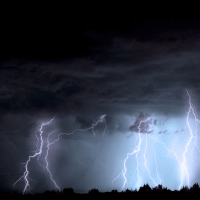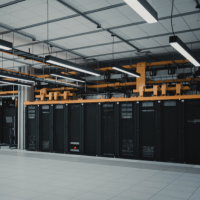Climate change is reshaping our environment and reverberating through the business world. One sector feeling the heat, both figuratively and literally, is data centers. As global temperatures rise, the intricate web of technologies powering our digital age faces new challenges and costs.
Environmental shifts impact the operational costs and expenses of data centers. Fluctuating energy availability due to climate-related events poses additional challenges, potentially leading to downtime. To adapt, data centers can focus on energy efficiency, renewable resources, and other power alternatives. TenHats offers secure and reliable data center infrastructure for businesses powered primarily by renewable energy.
How the Environment Affects Data Centers
Data centers power global commerce, government, and recreation. However, these critical hubs face a new set of challenges as climate change accelerates. Beyond the immediate environmental impacts, the ripple effects hit the economics of data centers.
Cooling Costs
Data centers generate a significant amount of heat due to the high-powered servers and equipment they house. As global temperatures rise, especially in regions prone to heatwaves, data centers will require more robust and energy-intensive cooling solutions. This leads to increased operational costs.
Energy Prices
Climate change can affect the availability and cost of energy. For example, changing precipitation patterns may impact availability in regions heavily reliant on hydropower. Additionally, extreme weather events (e.g., hurricanes, storms, and wildfires) can disrupt the power supply. This leads to higher energy costs and potential downtime for data centers that don’t have a steady source of power.
Learn how the right data center can boost ROI, reduce costs, and promote sustainability.
Location Considerations
Data center location is crucial, as climate conditions can have a significant impact. Areas prone to extreme weather events, like coastal regions susceptible to hurricanes, may require more substantial investments in infrastructure and precautions, potentially driving up costs.
Insurance Costs
As climate-related risks increase, insurance premiums for data centers may rise. This can be due to the higher probability of climate-related damages and the increased cost of insuring against these risks.
Regulatory Compliance
Governments are implementing more stringent environmental regulations and standards. Data centers may face higher compliance costs to meet these requirements, such as implementing energy-efficient technologies, utilizing renewable energy, and adhering to emission reduction targets.
Carbon Taxes and Pricing
Some jurisdictions are implementing carbon pricing mechanisms or taxes to incentivize businesses to reduce their carbon footprint. This could directly impact data centers located in these areas, especially those with high energy consumption, with increased taxes. These costs could potentially be passed along to the customer.
Supply Chain Disruptions
Climate change-related events can disrupt supply chains, affecting the availability and cost of critical components and materials used in data center construction and maintenance. For instance, extreme weather events can disrupt the production and transportation of server components.
Environmental Threats to Data Centers
Climate change also poses several significant threats to data centers. These threats can have far-reaching consequences for businesses, governments, healthcare organizations, and individuals who rely on a data center service provider.
Extreme Temperatures
Rising temperatures can lead to more frequent and severe heatwaves. Data centers are highly sensitive to temperature fluctuations, and excessive heat can lead to overheating of servers and other critical equipment. This can result in system failures and data loss. On the other end of the spectrum, extreme cold can also be a threat. The extreme cold can lead to freezing, which then affects the performance of cooling systems and may lead to condensation-related damage.
 Power Grid Vulnerabilities
Power Grid Vulnerabilities
Climate change can lead to more frequent and severe weather events, such as:
- Hurricanes
- Storms
- Tornadoes
Learn how a data center disaster recovery plan is important for business continuity.
These events can damage power infrastructure, leading to power outages and disruptions to data center operations.
Rising temperatures can lead to increased demand for cooling, which can strain local power grids. Considering that data centers account for around 1 – 1.5% of global electricity use, this can lead to potential brownouts or blackouts.
Drought and Water Scarcity
Data centers require significant amounts of water for cooling purposes. Drought conditions can strain local water resources, potentially leading to conflicts with other industries and communities over water access.
Wildfires
Wildfires generate large amounts of smoke and particulate matter, which can be drawn into data center ventilation systems, potentially causing damage to sensitive equipment. They can also lead to power outages due to damaged power lines or an intentional shutdown by utilities to prevent further spread. This can also lead to disruptions of data center functionality.
What Data Centers Can Do To Prepare
 Data centers play a critical role in the digital infrastructure of our world. As climate change continues to pose challenges, it’s important for data centers to take proactive steps to adapt and mitigate their impact.
Data centers play a critical role in the digital infrastructure of our world. As climate change continues to pose challenges, it’s important for data centers to take proactive steps to adapt and mitigate their impact.
Energy Efficiency and Renewable Resources
Data centers can implement energy-efficient technologies and practices to reduce overall energy consumption. They can also power their centers with renewable energy sources like:
- Solar
- Wind
- Hydroelectric
It’s important to keep in mind that there are limitations to powering data centers with 100% clean energy. However, as time passes, more data centers—like TenHats—will function primarily on clean energy.
Cooling Efficiency
There are multiple ways to optimize cooling systems to minimize energy use. This could involve using outside air for cooling in cooler climates or employing more efficient cooling technologies like hot/cold aisle containment.
Site Selection and Design
Data center operators can choose locations that are less susceptible to climate-related risks (e.g., flooding, hurricanes, wildfires). Designing resilient infrastructures, including reinforced buildings and flood barriers, can help data centers withstand extreme weather events.
Energy Storage and Backup Systems
Energy storage solutions like batteries are excellent options for data centers. They ensure an uninterrupted power supply during grid disruptions caused by extreme weather events.
Partnering with TenHats
It’s one thing to know you need a data center for your business. Choosing the right data center is another issue. Fortunately, TenHats makes it an easy decision. Our 10,000-square-foot, purpose-built data center runs primarily off of renewable, reliable hydroelectric and solar power from the Tennessee Valley Authority.
Our colocation data center provides a secure and reliable IT infrastructure for your business. By partnering with us, you enjoy:
- Data storage
- Network connectivity
- Improved security
- Enhanced reliability and redundancy
It also helps form the foundation of your backup and disaster recovery plan. On top of copies of critical data that fuel your recovery plan, our facility is strategically located to increase data center resiliency. Located in Knoxville, TN, the Great Smoky Mountains provide natural protection from hurricanes and other natural disasters, limiting the disruption to our power supplies.
Don’t wait for a climate-related disaster to happen. Contact us today to start a conversation.
Climate-related events lead to fluctuations in energy availability and potential downtime. To address these challenges, data centers can prioritize energy efficiency and explore renewable resources. TenHats provides businesses with a secure and dependable data center infrastructure primarily powered by renewable energy.
Located in Knoxville, TN, our purpose-built colocation data center can serve any organization in East Tennessee and beyond. With our team’s IT experience, we provide a lot more than simply protected data. When you call us, you talk to a real IT expert, not a call operator. Connect with our team about our data center today!


